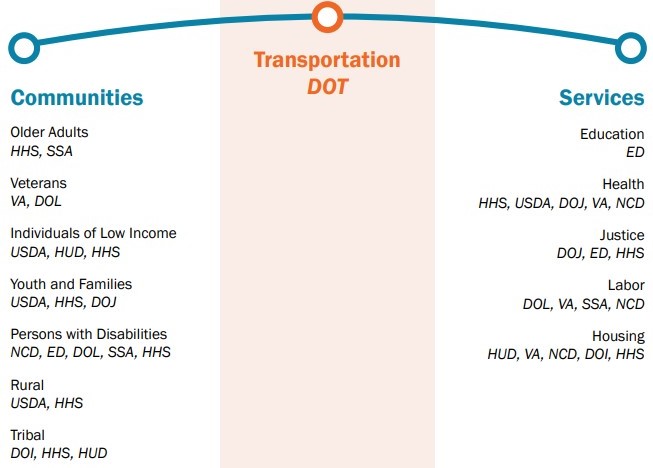Coordinating Council on Access and Mobility
Learn More About the CCAM

CCAM Members | CCAM Multisector Partner Directory | CCAM-Related Interagency Initiatives |CCAM-Related Reports | FAQs | 2023 – 2026 CCAM Strategic Plan | CCAM Program Inventory | CCAM Federal Fund Braiding Guide
What's New
- FTA published an update to the Charter Service Regulation. The final rule removed the outdated federal financial assistance programs listed in Appendix A, and FTA clarified that Qualified Human Service Organizations (QHSOs) receiving funding under one or more of the programs in the CCAM Program Inventory are not required to register on the FTA charter service website to receive charter service from a recipient; reducing the administrative burden of charter registration for many QHSOs. Learn more here.
- The CCAM updated the CCAM Multisector Partner Directory, which now includes over 100 national partner organizations relevant to CCAM. The directory provides a comprehensive view of stakeholders across transportation, health, housing, and other sectors. Each listing includes a description, CCAM association, and focus areas, making it easier for CCAM Members and partners to find and coordinate cross-sector partnerships.
- The CCAM updated the CCAM Program Inventory, which identifies more than 130 federal programs that may provide funding for human services transportation for individuals with disabilities, older adults, and individuals of low income. The updated program inventory includes detailed program information, such as Assistance Listing Numbers (formerly Catalog of Federal Domestic Assistance (CFDA)), statutory references, types of recipients and beneficiaries, and eligible transportation activities. Alongside the Program Inventory, CCAM developed the Federal Fund Braiding Guide, which defines federal fund braiding for local match and provides guidance to potential grantees and CCAM agency program managers on acceptable arrangements for transportation-related projects.
Overview
The Coordinating Council on Access and Mobility (CCAM) is a federal interagency council that works to coordinate funding and provide expertise on human services transportation. Human services transportation fosters personal mobility by connecting people to their homes, jobs, education, medical appointments, and all their communities have to offer.
The CCAM focuses on programs for three targeted populations: individuals with disabilities, older adults, and individuals of low income. The CCAM was:
- Established in 2004 by Executive Order 13330
- Referenced in a note to 49 U.S.C. 101 since 2006, which identifies the CCAM as supporting several objectives of the USDOT
- Given tasks by Congress in 2015, in Section 3006(c) of the 2015 Fixing America’s Surface Transportation (FAST) Act.
The CCAM works to improve federal coordination of transportation resources and address barriers faced by states and local communities when coordinating transportation. Led by the DOT Secretary, its mission is to issue policy recommendations and implement activities that improve the availability, accessibility, and efficiency of transportation for CCAM’s targeted populations.
View the CCAM’s 20th Anniversary Video showcasing recent accomplishments.
CCAM Structure

The Secretary of Transportation chairs the CCAM, and 10 additional federal department and agency leaders form the remaining CCAM membership. Nine of the 11 total CCAM members include:
- Department of Agriculture (USDA)
- Department of Education (ED)
- Department of Health and Human Services (HHS)
- Department of Housing and Urban Development (HUD)
- Department of the Interior (DOI)
- Department of Justice (DOJ)
- Department of Labor (DOL)
- Department of Transportation (DOT)
- Department of Veterans Affairs (VA)
These agencies currently support grant programs that can fund human services transportation. The additional two CCAM members— the National Council on Disability and the Social Security Administration— provide valuable expertise to enhance the CCAM’s ability to serve its targeted populations.
Technical Assistance
The Transportation Technical Assistance Coordination Library provides a sustainable methodology and platform to access resources through transportation technical assistance centers and FTA.
FTA-sponsored Technical Assistance (TA) Centers
FTA funds TA centers through national nonprofit organizations who play a critical role in supporting public transit agencies to:
- Improve the availability and efficiency transportation for older adults and people with disabilities
- Drive the adoption of mobility management and related promising practices
- Accelerate innovative mobility practices and strategies
- Support rural communities
- And more…
 CCAM TA Center (CCAM-TAC): Promotes and facilitates human services transportation, public transit, and non-emergency medical transportation (NEMT) coordination that advances people’s access to everyday destinations. Separate from CCAM—the federal interagency council—, CCAM-TAC is the national TA center “arm” that helps share the federal-level coordination and resources broadly at national, state, and local levels.
CCAM TA Center (CCAM-TAC): Promotes and facilitates human services transportation, public transit, and non-emergency medical transportation (NEMT) coordination that advances people’s access to everyday destinations. Separate from CCAM—the federal interagency council—, CCAM-TAC is the national TA center “arm” that helps share the federal-level coordination and resources broadly at national, state, and local levels.
The CCAM-TAC is supported by the Federal CCAM-TAC Agency Partner Advisory Group:
- U.S. Department of Transportation’s Federal Transit Administration
- U.S. Department of Agriculture’s Rural Development
- U.S. Department of Health and Human Services’ (HHS) Administration for Children and Families
- HHS’ Administration for Community Living
- HHS’ Centers Medicare and Medicaid Services
- HHS’ Health Resources and Services Administration
- U.S. Department of Labor’s Office of Disability Employment Policy.
For additional technical assistance information and resources, visit the FTA-Sponsored Technical Assistance, Training, and Research Resource Programs webpage.
Transportation Coordination

Coordinating individual human services transportation programs make the most efficient use of limited transportation resources by avoiding duplication caused by overlapping individual program efforts and encouraging the use and sharing of existing community resources. In communities where coordination is made a priority, citizens benefit from more extensive service, lower costs and easier access to transportation. Coordination can lead to:
- Improved overall mobility within a community, particularly when human service agencies are each providing transportation to their own clients.
- Elimination of inefficiencies within disparate operations and service patterns that often result from a multiplicity of providers. Greater efficiency helps to stretch the limited (and often insufficient) funding and personnel resources of these agencies.
- Significant reductions of operating costs (per trip) for transportation providers.
- Enhanced transportation and higher quality services for the people in need of transportation when operations are coordinated.
Visit the Transportation Coordination website to learn more.
